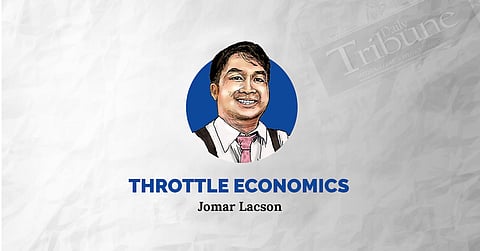
- NEWS
- the EDIT
- COMMENTARY
- BUSINESS
- LIFE
- SHOW
- ACTION
- GLOBAL GOALS
- SNAPS
- DYARYO TIRADA
- MORE

There has been much media coverage of the alleged anomalies surrounding flood control projects. President Ferdinand Marcos Jr. expressed his anger over a project in Bulacan, where it was reported to have been completed, yet the project was visibly incomplete.
In his privilege speech last week, Senator Panfilo Lacson revealed the same: uncompleted flood control projects, constant repairs using substandard materials, and “ghost” projects.
The investigations are positive signals from the government, considering the relevance of flooding. We are in the middle of our rainy/typhoon season and are dealing with cloudbursts that can release flash floods with very little warning in flood-prone streets and create disruptions in multiple cities.
Corruption, however, is not seasonal. Reports on Bulacan flood control projects focus on this issue. While Bulacan is highlighted by corruption, climate change affects all areas. In contrast, while corruption has been described as systemic, it is still a choice made by individuals. Some individuals may choose not to be corrupt.
In economic theory, corruption can be modeled as a principal-agent problem. (The principal-agent problem is like an employer-employee). The principal wants the agent to work with his goals (profit maximization/security) in mind, while the agent wants to maximize his/her goals (leisure). The key is to align both the principal and the agent’s interests. This is where pay and bonuses (incentives) come to play.
On a macro scale, the taxpayers are the principal and the government is the agent. With respect to the ongoing flood control issue, the principal is the government, while the contractors are the agents. How do we align the interests of the principal and the agent in this case?
President Marcos signaled one way when he considered the flood control issue a form of economic sabotage. This creates a failure to complete and poor-quality construction, a crime that can be penalized with imprisonment based on a recent law that made smuggling in agricultural products a form of economic sabotage.
Economic sabotage is an activity that is designed to disrupt, undermine, or damage the economy and the people’s welfare. The alignment of the principal-agent’s interests can also be performed with penalties or punitive measures.
One personal preference is to require that the location of a contractor’s assets be within the flood prone zone so that it would be in their interest to do a good job and protect the area from flooding. But this is just wishful thinking, as it is unlikely to be enforceable.
However, the goal does not change—if we want flood control projects to be within specifications and completed on time, then the alignment of our interests should be part of the non-negotiables.
There is one critique of the principal-agent problem. Aligning interests is one thing. Making sure the principal’s interests are also principled is another. The contractor as an agent can corrupt the public officer only if the latter is corruptible or lacks the principled behavior to avoid being corrupted. This is an area where citizens are actually empowered to choose principled principals or leaders who are aligned with our core values. Only then can we feel more trust in the projects that our taxes finance.
Whether we realize it or not, the impact of climate change should align all our interests. Flooding is the biggest natural disaster that results in damage to lives and assets. It is a far greater factor than other major disasters, particularly typhoons and earthquakes. Climate change can be about the weather, but we cannot dismiss corruption easily or downplay it as “weather-weather lang yan.”
Climate adaptation includes flood management, but its effectiveness is strengthened by the principles of good governance.
